I’m caught up in a weird sleep cycle because of recently being in Paris, etc. And I can’t write about Martin Scorsese‘s Rolling Thunder Revue (which I saw around midday) until Monday. So I have to take a nap but in the meantime…
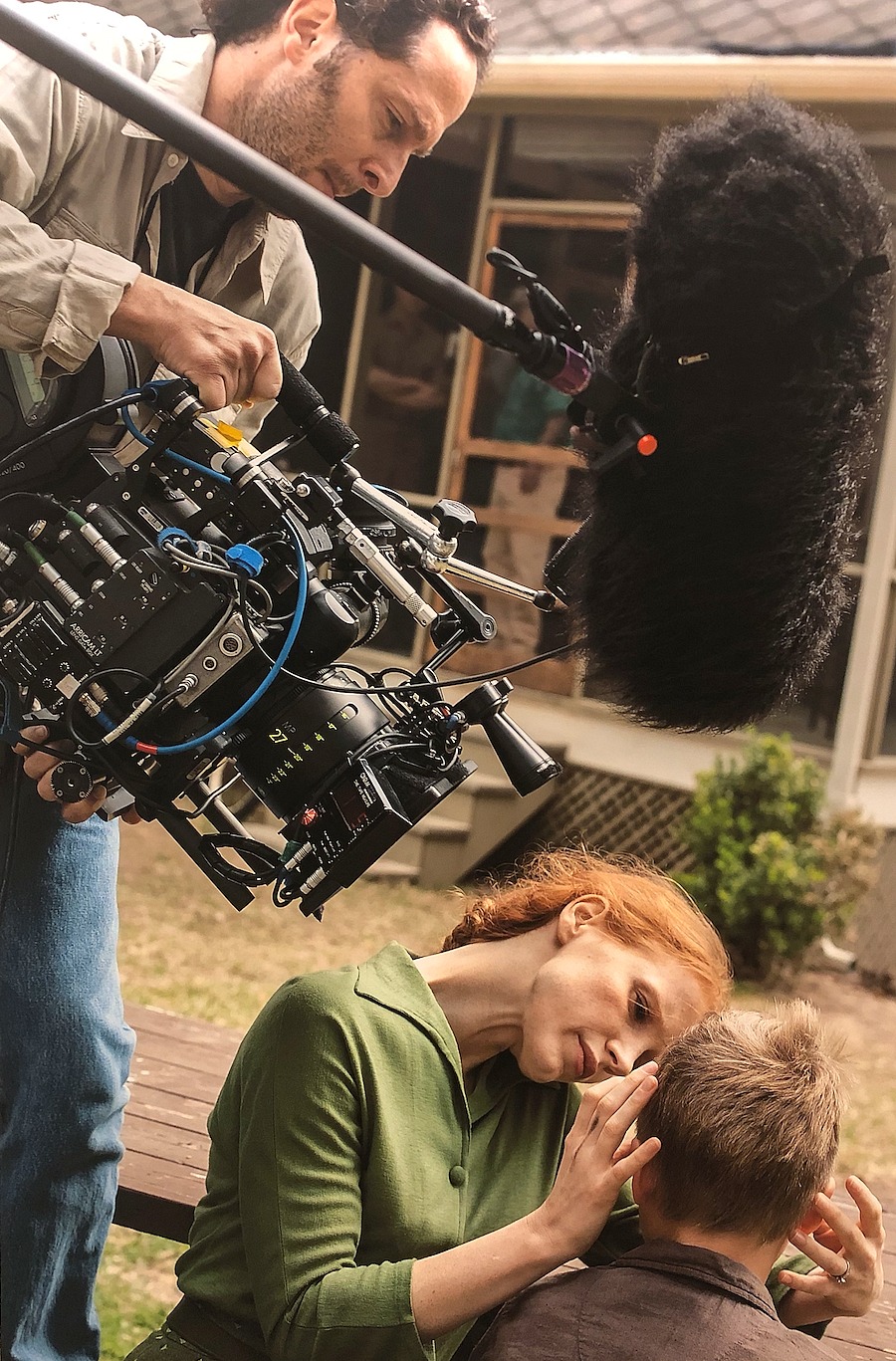
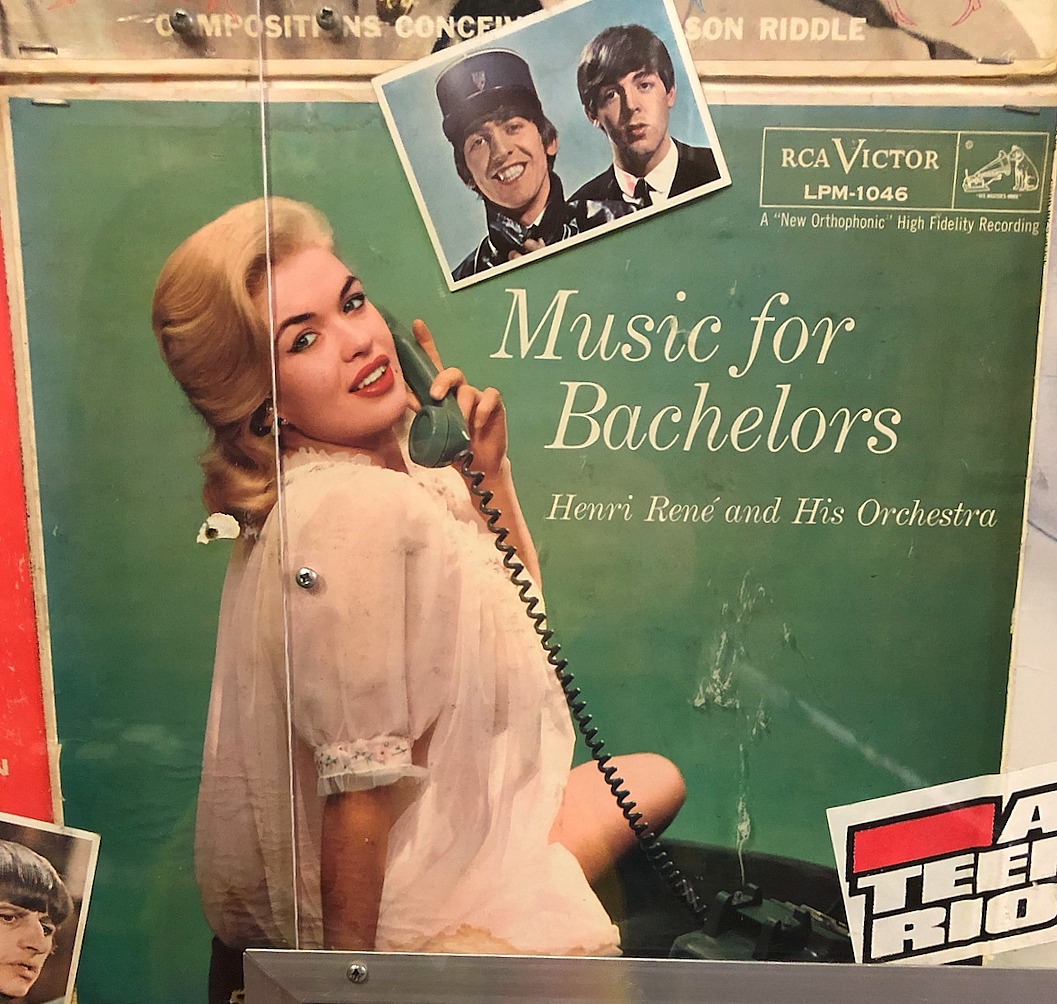
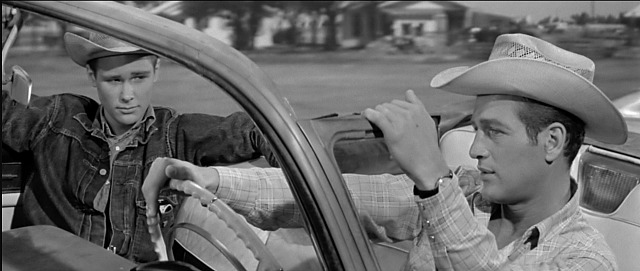
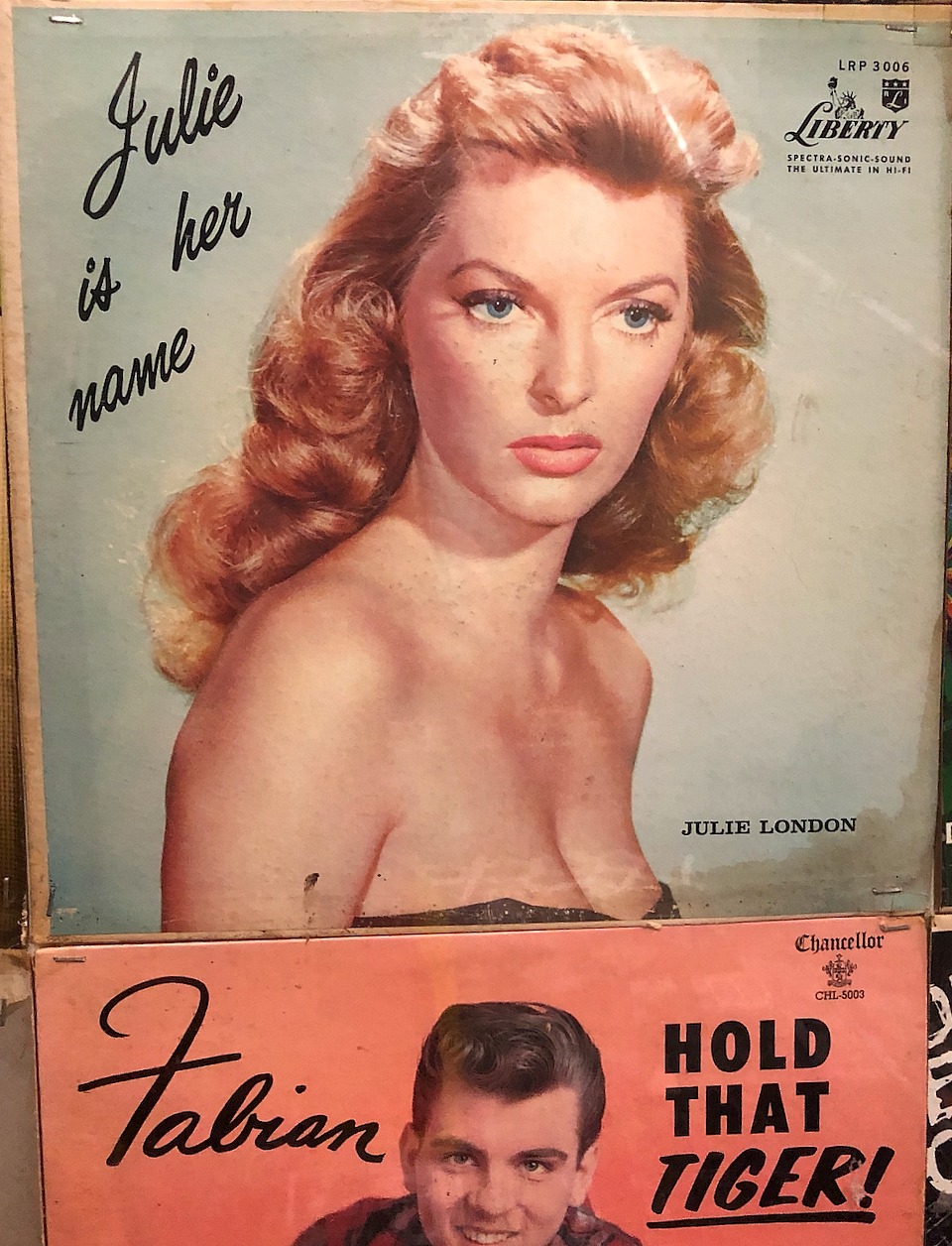
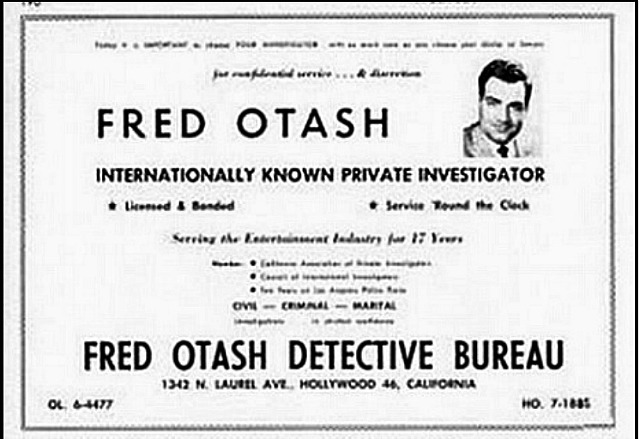
I’m caught up in a weird sleep cycle because of recently being in Paris, etc. And I can’t write about Martin Scorsese‘s Rolling Thunder Revue (which I saw around midday) until Monday. So I have to take a nap but in the meantime…





[Originally posted on 8.20.15]: Director Rod Lurie is conducting another Hollywood-centric Facebook poll, this time about the greatest-ever lead performances in feature films. Which right away excludes James Gandolfini in The Sopranos so the HE version is allowing performances from longform cable.
Lurie started me off with a taste of 20 performances, and right away I was saying to myself “these are too familiar, too boilerplate…where’s that special-passion choice that defies conventional thinking?”
What is a greatest-ever performance anyway? My theory is that picks in this realm have less to do with skill or technique or even, really, the actor, and a lot more to do with the viewer and what they choose to see. The choices that people make tend to reflect their intimate personal histories on some level. Because they’re choosing performances or more precisely characters who closely mirror and express their deepest longings, fondest hopes and saddest dreams.
My late younger brother was tremendously moved by Mark Ruffalo‘s portrayal of a loser in You Can Count On Me, in large part because my brother was that character. I know a lady who’s always felt close to Vivien Leigh‘s Scarlett O’Hara in Gone With The Wind for the same reason. Bill Clinton once said on a High Noon DVD documentary that Gary Cooper‘s performance in High Noon is his all-time favorite because Will Kane‘s situation (everyone chickening out when things get tough and leaving him to stand alone) reminded him of what it’s often like for a sitting U.S. President.
When I began to assemble my pantheon the first nominees that came to mind were Gandolfini, Marlon Brando in On The Waterfront, Monica Vitti in L’Avventura, Amy Schumer in Trainwreck (I’m dead serious), George Clooney in Michael Clayton, Gary Cooper in High Noon, Mia Farrow in Broadway Danny Rose, Lee Marvin in Point Blank, Alan Ladd in Shane, Brad Pitt in Moneyball, Marilyn Monroe in Some like It Hot and Jean Arthur in Only Angels Have Wings. This is without thinking anything through or second-guessing myself.
Tatyana wants to visit the Getty Museum tomorrow (i.e., Saturday). The Getty isn’t a “museum” as much as a consecrated tourist destination for weekend lookie-lou types. I generally avoid tourist destinations as I can’t abide the company, especially the way these places make me feel like I’m one of “them”. In my mind there are few things worse than this because it means a constant replay of “lemme outta here, lemme outta here, lemme outa here.” I would rather be confined for five hours inside a dank, windowless basement room with puddles on the floor and rats scurrying about than visit the Getty on a weekend. Visiting on a weekday afternoon might be a different thing. A couple of years ago I was given access to a private viewing of the Louvre’s Ancient Egypt exhibit — the absence of lines, crowds and people crowding into souvenir ships afforded all manner of sublime pleasures.
In a Fangoria q & a, Jordan Peele tells the following to Midsommar director Ari Aster: “I think you’ve made the most idyllic horror film of all time. You’ve taken Stepford Wives and shattered the attractiveness of that movie with this one. That alone is a feat. This movie is just so unique. This hasn’t existed yet, and anything after Midsommar (A24, 7.3) is going to have to contend with it. I mean, this usurps The Wicker Man as the most iconic pagan movie to be referenced.
“It plays a weird sleight of hand [in which] it transcends the horror of itself. It is an ascension of horror. I didn’t feel victimized; I felt like I was being put up on this pedestal and honored through the eyes of the protagonist. It’s a very unique feeling for a film to conjure because after it ended, I found myself looking back at the final act like, ‘Holy shit.’ That was some of the most atrociously disturbing imagery I’ve ever seen on film, and yet I experienced it with this open-mouthed, wild-eyed gape. I think that part of how we get there is never reducing the villains to any kind of snarling monsters with an evil agenda.”
Hereditary sold me on the idea of Aster being an inspired, X-factor. deft-touch director. My kind of elevated-horror guy and then some. I was very excited about seeing Midsommar (and I still am) but Jordan Peele creaming all over it scared me half to death.
What’s the point of staging an extreme pagan festival every 90 years? Isn’t that a bit much? Wouldn’t ten years make more sense? Or at the most every 25 years? And where does this Swedish village find these extreme 20something psychos? Notice: Does insanity run in your blood? Were your grandparents or great-grandparents committed to state asylums for the criminally insane? If so, the organizers of a once-every-90 years festival are looking to talk to you and possibly enlist you in their cause.”
I’ll be catching Martin Scorsese‘s Rolling Thunder Revue (Netflix, 6.12) late Friday morning, but knowing I can’t attend the big, ultra-cool 6.10 Manhattan screening (Alice Tully Hall followed by a Tavern on the Green party) breaks my heart into little pieces.
6.11 “road show” screenings will happen in London, Paris, Washington, D.C., Nashville, Philadelphia, San Francisco, Boston, Austin, Dallas, Houston, Portland, Tulsa, Tempe, Chicago, Cleveland, Minneapolis, Bologna and Sydney as well as in Los Angeles and New York, the two cities where the film will continue to play the following day and beyond.
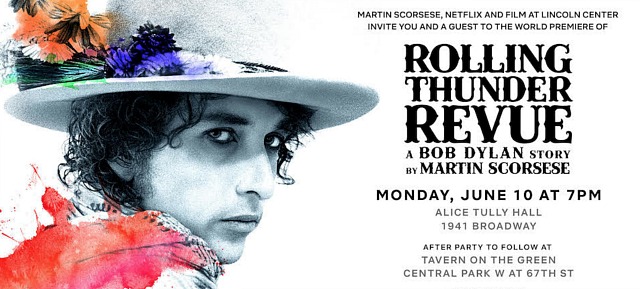
From “Bob Dylan’s Glam Hootenanny: Returning to Rolling Thunder,” a 6.5 N.Y. Times piece by Jon Pareles: “How distant the mid-1970s seem now. They were unkempt, hairy, hedonistic, improvisational, analog, inefficient — anything but neatly calculated and Instagram-ready. Post-psychedelic and pre-AIDS, they were a continuation of the idealistic, natural 1960s, yet they were also an immediate precursor to the polymorphous, synthetic, role-playing disco era.
“The bitterness of Vietnam and Watergate lingered; hippie utopianism was giving way to a more selfish search for individual satisfaction. Things were still scruffy, but not quite so communal.
Yesterday YouTube announced a decision to specifically prohibit hate-agenda videos, or those “alleging that a group is superior in order to justify discrimination, segregation or exclusion based on qualities like age, gender, race, caste, religion, sexual orientation or veteran status,” per a statement posted here.
This sounds like the right way to go except — except! — when it comes to removing Leni Riefenstahl‘s Triumph of the Will (’35), a rhetorically abhorrent but nonetheless masterful piece of political propaganda.
Will is subject to removal because it “promotes or glorifies Nazi ideology, which is inherently discriminatory,” the YouTube statement declared. Indiewire‘s Eric Kohn has reported that a full-length Triumph was removed from YouTube last night. But there are still several clips from the film currently viewable.
The problem is that the cinematography and editing of Triumph of the Will have long been regarded as brilliant in and of themselves. On a purely visual level the film is widely acknowledged as a seminal influencer of generations of filmmakers. Some critics claimed that Will seemed to have influenced the final resistance-assembly scene in Star Wars when Han, Luke and Chewy are awarded medals by Princess Leia. And don’t forget that 1984-ish Apple ad.
There isn’t a cinematographer or director who won’t acknowledge that Triumph of the Will is a major cinematic milestone.
Obviously it can be watched via other platforms. I own a high-quality Bluray that Robert Harris restored in 2015. But what YouTube has done feels slippery-slopey.
There is a difference between garden-variety hate-mongering and important cinematic history.
If you take Triumph of the Will down from YouTube then in a certain way the Nazi Nuremberg rally of 1934 “didn’t happen”, and once you do that elsewhere how different would it be, really, to remove any and all visual records of the Holocaust? Because once you’ve done that in all formats then the murder of six million Jews “didn’t happen” either. The sword cuts both ways.
Over the last 40-plus years scores of filmmakers have used rock tunes to deliver undercurrents in their films, but no one has ever done this as masterfully as Martin Scorsese, the cinema’s ultimate rock-music maestro. No, this is not an original observation.
But here’s a semi-original one: What makes Scorsese’s rock-scoring so memorable is that once you watch a Scorsese passage that’s been perfectly blended with a well-known track (like that Goodfellas montage of Jimmy Conway murders underlaid with Eric Clapton‘s “Layla” or Harry Nilsson‘s “Jump Into The Fire” augmenting that classic cocaine-frenzy scene with Ray Liotta running around), the song always acquires an extra dimension of some kind — it becomes a stronger song for the association. As in forever.
Example #1: I’d always enjoyed Jimmy Castor‘s “Hey Leroy, Your Mama’s Calling You,” but it acquired a mythic element when Scorsese used it in that cranked-up Stratton Oakmont scene in The Wolf of Wall Street. It retains that association to this day.
Example #2: That Alice Doesn’t Live Here Anymore scene in which Scorsese takes us from a Gone With The Wind-ish yesteryear sequence with young Alice singing that Alice Faye song (“You’ll Never Know”) to Socorro, New Mexico circa 1974, and this is achieved with the playing of Mott The Hoople‘s “All The Way to Memphis.” It was this scene that sold me on Mott The Hoople — this plus “All The Young Dudes,” I mean.
Example #3, #4, #5 and “#6: The “Mean Streets” quartet — the “Be My Baby” opening credits, the Rolling Stones’ “Tell Me” scene in which Harvey Keitel enters the bar and says hello to everyone, the scene in which Robert DeNiro enters the same bar to the sounds of “Jumpin Jack Flash” and the “Please Mr, Postman” fight scene in that basement-level pool hall.
Example #7: The Mickey & Sylvia “Love Is Strange” moment in Casino when Robert De Niro decides that he’s gotta have Sharon Stone‘s hellcat hustler.
Big question: What non-Scorsese films have delivered phenomenal rock-tune scorings? List your top two or three.
HE to Rob Garver, director of What She Said: The Art of Pauline Kael: “I saw your brilliant, deeply moving doc in Telluride in 2018, but here we are eight months later and no distribution arrangement? It seems to still be playing the festival circuit (Miami last January, Princetown and Edinburgh this summer) but I don’t understand why it isn’t available as a streaming option at this stage. I would kill to own a Bluray of your film.
“Plus now there’s a 100th anniversary celebration of Kael’s favorite films happening at the Quad (6.7 thru 6.20) and they aren’t showing your doc as part of the presentation? What’s up with that?
Critic friend: “It’s mystifying [that distribution for Garver’s film hasn’t been arranged]. People are acting like there isn’t a big enough audience for it, but documentaries come out every day that have a micro-sliver of an audience (if that). And the movie’s terrific! I was almost shocked by how good it was (given that it’s basically the story of Pauline’s writing — a tricky vantage to sustain over a whole movie).
“I’m always astounded at the hostility to Pauline that comes up in your reader comments, as if her opinions are now not worth the paper they were printed on. Jesus — the levels of male myopia. (And yes, I do think it’s a dude thing.) But as a fan, both of her and the movie, you should really beat the drum for a distributor to pick it up. I could see it playing for a month at Film Forum alone.”
And in Los Angeles at the Nuart or Westside Pavillion. And at the Castro in San Francisco. And so on. And then onto Bluray and streaming.
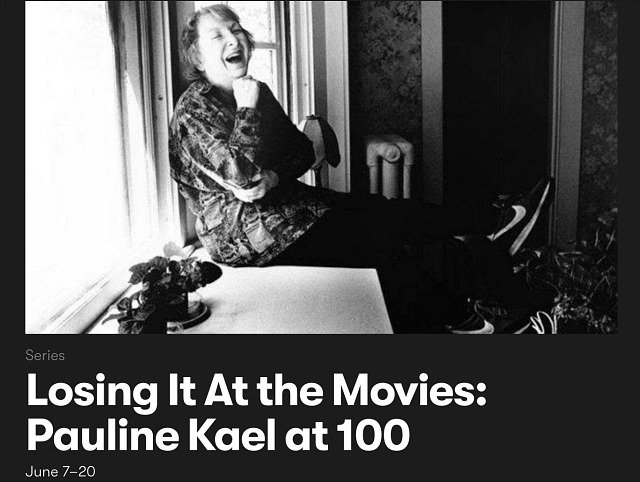
Tatyana was detained early yesterday evening by the U.S. Customs and Border Protection guys, simply because she struck them as detainable and harassable. Because she’s Russian-born and isn’t a U.S. citizen (although she has a green card), and because they figured “let’s get her.” They asked Tatyana to step out of the passport line and then held her for an hour or so inside a large, locked-down room with 40 or so non-American types (mostly Asian, Mexican and African).
Because this is what the border guys do — they give exotics (i.e., anyone they don’t like the look of or whose name strikes them as weird-sounding) a hard time. And this isn’t just a Trump administration thing — this apparently happened a lot during the Obama years. I did a few Google searches about detainments, and the complaints stretch back a good eight to ten years.
I repeatedly texted and called Tatyana a good seven or eight times, but they didn’t let her answer. There were several signs on the detention room wall that said “no cell phone usage”, but that’s not fair to the detainees’ loved ones…c’mon! So when she tried to very briefly give me an idea about what was happening they told her “put that phone down.” She was finally allowed to leave after 80 minutes or so. Nice operation, guys. Keep harassing those foreign types, let ’em know what for.

HE response: Michelle Williams‘ Gwen Verdon out-points Sam Rockwell‘s Bob Fosse, agreed, but both are knockouts. I’ve been saying all along that Williams gives the more affecting performance, but Rockwell’s expression as he’s lying on that Washington, D.C. sidewalk at the very end of “Providence” (premiered on 5.28, caught it yesterday on the plane) is one of those unforgettable moments. His eyes don’t convey shock or terror but a kind of quizzical “really?” He seems almost half-amused by the realization that there really is such a thing as an “end” of a life. The way he’s looking at Williams and going “wow, okay, this is it…thanks for our life together, turbulent as it sometimes was…sorry I was such a selfish dick but that’s who I am or, you know, what I was”…WOW! Yes, Williams owns it for the most part, but Rockwell’s Fosse is easily his finest performance and his first epic one.
I offered to divulge the ending of Once Upon A Time in Hollywood to a friend, and she said “sure.” I sent it along. Her reaction: “Oh, I kind of like that. But it’s definitely a shitstorm waiting to happen.”
I offered the same info to a producer friend. She politely declined but mentioned that “the ending is posted on Wikipedia” so it’s not a big deal anyway. I went right to the page….hilarious! The Wiki ending is all but completely fabricated.
In a 6.6. Hollywood Reporter piece about Quentin Tarantino’s film, Tatiana Siegel wrote that “the road will inevitably get bumpier for Tarantino over the ensuing weeks,” in part because “the film features graphic depictions of violence against women.”
Siegel is alluding to beatings along the lines of what happened to Jennifer Jason Leigh‘s character in The Hateful Eight, which I for one found sadistic and repellent. No specifics, of course, but I didn’t have this same reaction to the alluded-to violence in OUATIH.
From 5.23.19 Intercept podcast titled “Joe Biden Would Be A Disaster”:
Excerpt #1: “I think it is patently absurd the notion that [Joe Biden] thinks he’s the future of a party where, in fact, he’s been one of the backbones of it for the better part of five decades.”
Excerpt #2: “Biden is that guy. He’s the guy who is so familiar. He is the middle of the road, I take the train, Amtrak, Delaware, folksy, aw shucks, not perfect, not polished, not ivy league, not a woman, not a person of color, not gay, right? Like, he’s all the things that revert back to who historically had always had the grip on power and the reassurance that that kind of person might still have a grip on power.”
Excerpt #3: “People say ‘electable, electable,’ but this is the era of Donald J. Trump. Does anyone even know what electable means anymore? What counts as electable? Never forget [that] in 2016, 17 Republicans ran for their party’s presidential nomination and the guy from Home Alone 2 won. So anyone who tells you at this stage that Biden has this in the bag is either a liar or a fool.”